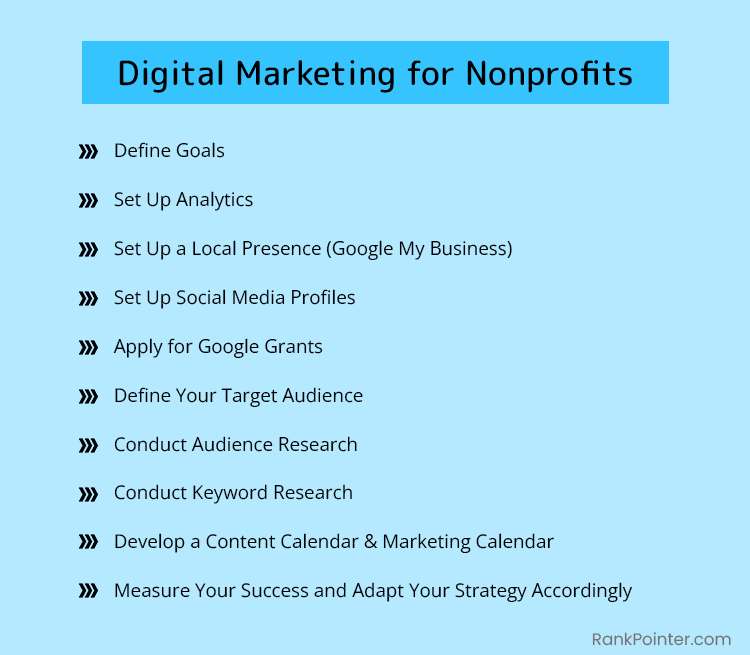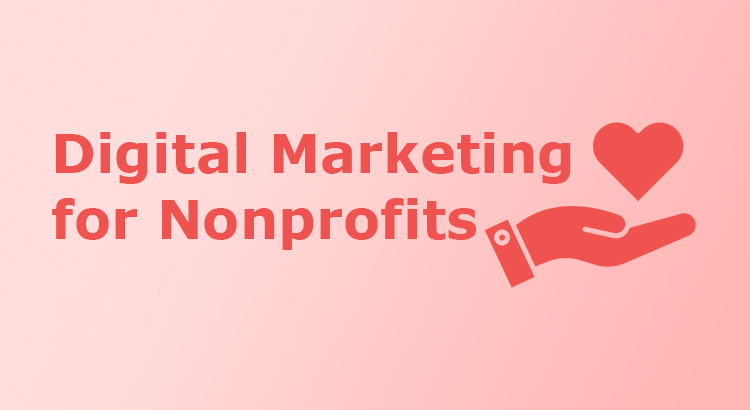Consider your digital marketing plan as a roadmap to showcase your organization’s services to the community. While each nonprofit’s strategy may differ, the ultimate goal remains consistent: amplifying your mission. This guide offers 10 adaptable tips on digital marketing for nonprofits tailored to achieve their objectives and values.
Tips on Digital Marketing for Nonprofits
Here are the top digital marketing strategies for nonprofit organizations.
1. Define Goals
Before diving into digital marketing tactics, it’s crucial for nonprofits to define clear and specific goals. Setting measurable objectives is the foundation of a successful digital strategy.
By following the SMART criteria (specific, measurable, achievable, relevant, and time-bound), nonprofits can develop strategies tailored to their unique mission and audience.
2. Set Up Analytics
Analytics play a vital role in understanding audience behavior, measuring the effectiveness of marketing efforts, and optimizing campaigns for better results.
Setting up tools like Google Analytics and Google Search Console allows nonprofits to track website traffic, visitor demographics, and user engagement, providing valuable insights to inform decision-making and strategy refinement.
3. Set Up a Local Presence (Google My Business)
Creating a strong local presence through platforms like Google Business Profile helps nonprofits connect with their community, provide essential information, and promote events or initiatives effectively.
From managing business listings to engaging with users through reviews and updates, GMB offers valuable opportunities to enhance visibility and engagement at the local level.
4. Set Up Social Media Profiles
Social media platforms serve as powerful channels for nonprofits to raise awareness, engage with supporters, and drive action.
By creating compelling profiles, scheduling content, responding to comments, and utilizing relevant hashtags, nonprofits can maximize their impact, expand their reach, and foster meaningful connections with their audience.
5. Apply for Google Grants
Google Grants provide qualifying nonprofits with an opportunity to access $10,000 per month in online advertising credits, empowering organizations to reach a broader audience and amplify their message.
By leveraging Google Ads effectively, nonprofits can drive website traffic, promote campaigns, and increase online donations or volunteer sign-ups.
6. Define Your Target Audience
Understanding the demographics, preferences, and behaviors of your target audience is essential for crafting personalized messages and selecting the most effective communication channels.
By defining distinct audience segments and tailoring content to their specific needs and interests, nonprofits can enhance engagement and build stronger relationships with supporters.
7. Conduct Audience Research
Audience research enables nonprofits to gain deeper insights into the motivations, challenges, and preferences of their target audience, informing more targeted and effective marketing strategies.
By leveraging free tools and conducting thorough analysis, organizations can refine their messaging, optimize outreach efforts, and connect with supporters on a more personal level.
8. Conduct Keyword Research
Keyword research is a fundamental aspect of SEO and content marketing, helping nonprofits understand what terms their audience is searching for and how to optimize their online presence accordingly.
By incorporating relevant keywords into website content, blog posts, and advertising campaigns, nonprofits can improve visibility and attract more organic traffic.
9. Develop a Content Calendar & Marketing Calendar
A well-planned content calendar and marketing calendar provide nonprofits with a roadmap for creating and distributing content effectively across various channels.
By aligning content with audience insights, competitive analysis, and keyword research, organizations can ensure consistency, relevance, and engagement throughout their digital marketing efforts.
10. Measure Your Success and Adapt Your Strategy Accordingly
Continuous measurement and analysis are critical for evaluating the effectiveness of digital marketing initiatives and making data-driven decisions.
By setting Key Performance Indicators (KPIs) and monitoring key metrics, nonprofits can assess progress, identify areas for improvement, and adapt their strategy to achieve better results over time.

Closing Thoughts on Digital Marketing for Nonprofits
Effective digital marketing is essential for nonprofit organizations to raise awareness, attract supporters, and achieve their mission. Nonprofits can maximize their impact and drive meaningful change by following the strategies explained in this article.


